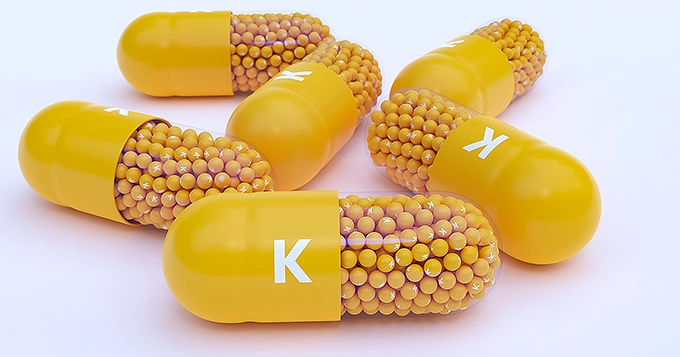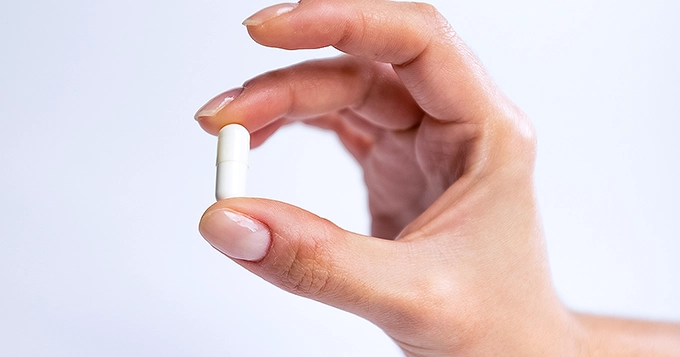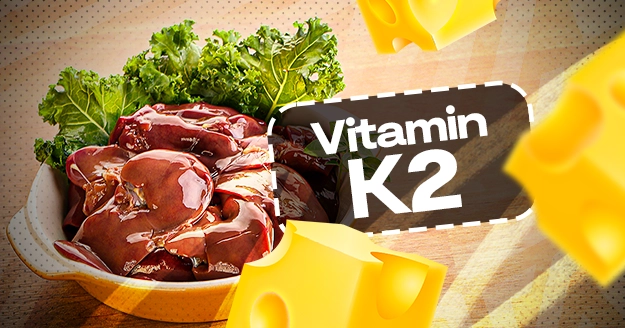What is K2?
K2 is a form of vitamin K.
Vitamin K is a fat-soluble vitamin that the body needs to produce a protein called prothrombin. This protein promotes blood clotting and regulates bone metabolism. It has two main forms, namely – vitamin k1 and vitamin k2.
Vitamin K-1, or phylloquinone, is found in dark, leafy green veggies and is the main dietary source of vitamin K.
Vitamin K-2, or menaquinone, is found in small quantities in organ meats and fermented foods. Bacteria in your gut also produce vitamin K-2.
Vitamin K-1 primarily contributes to blood coagulation, while K-2 has a wider range of functions in the body. In a study of 36,629 participants, a higher intake of vitamin K-2 was linked to a reduced risk of peripheral arterial disease (PAD), especially in those with high blood pressure. Conversely, K-1 did not affect PAD risk in the study.
Best Dietary Sources
Vitamin K2 can be obtained from foods. Dietary sources of K2 include:
- Natto
Japanese natto is a dish prepared from fermented soybeans. It is the best source of vitamin K2 and is high in many other nutrients that support intestinal health. 150 micrograms of vitamin K2 are found in one tablespoon of natto, which is approximately double the daily required amount.
- Sauerkraut
Another excellent source of vitamin K2 is sauerkraut, which has 2.75 micrograms per half-cup. Similar to natto, there are numerous health advantages to the fermentation process, including increased immunity and better digestive health.
- Egg yolk
There are 67–192 mcg of vitamin K2 in one egg yolk. But how much depends on what the hen consumes. Today, the majority of chicken feed is enriched with vitamin K, which is transferred to the egg. On the other hand, vitamin K deficits are more common in hens raised on maize or soy.
- Hard cheeses
Together with other minerals like calcium, vitamin A, and protein, cheeses are among the best sources of vitamin K2. You should, however, control your portion sizes because they are also high in saturated fats and calories. The amount of vitamin K2 in cheese varies, and in all varieties, it rises with age. The common cheeses that provide the most vitamin K2 per 50-gram serving are as follows:
- 50 micrograms in Munster
- 34 micrograms in Camembert
- 32 micrograms or so in aged Gouda and Edam
- 12 micrograms in cheddar cheese
- Organ meats, such as beef liver
One of the healthiest meat products is beef liver, which has all the nutrients you need to meet your daily requirements for nutrients like copper, riboflavin, folate, and vitamin A. A 100-gram serving also has around 11 micrograms of vitamin K2, making it one of the best meat-based sources of the vitamin.
Other food sources include:
- Pork
- Beef
- Chicken
- Salmon
- Pickles
Health Benefits of K2
- Heart health
Vitamin K2 can help lower the risk of heart issues and improve overall heart health. A 2015 review found that Vitamin K2 activates a protein that stops calcium deposits in blood vessel walls. The author suggested that a diet high in natural Vitamin K2 might lower the risk of coronary heart disease.
- Bone health
Consider incorporating a vitamin K2 supplement into your daily routine to ensure optimal bone health. Vitamin K2 plays a crucial role in maintaining strong bone density by activating osteocalcin, a protein responsible for binding calcium to bones.
In a 2019 study, researchers investigated the impact of MK-4 (K2) supplements on 29 postmenopausal women who had previously experienced hip or vertebral compression fractures. The results showed that a daily dose of 5 milligrams of MK-4 effectively reduced the levels of undercarboxylated osteocalcin, aligning them with the levels typically found in healthy premenopausal women.
- Anxiety and depression
When blood glucose levels are high, it increases your risk of developing issues like depression, anxiety, and problems with memory.
In a study back in 2016, researchers looked into how vitamin K-2 could help rats dealing with metabolic syndrome, high blood glucose levels, and symptoms of anxiety, depression, and memory loss. Surprisingly, after 10 weeks of treatment with vitamin K, the rats showed normalized blood glucose levels and improvements in anxiety and depression symptoms. Unfortunately, the vitamin didn’t have a positive impact on their memory deficits.
More research is still needed on its effects on humans.
- Cancer
Vitamin K2 contains antioxidant properties that could potentially act as a safeguard against cancer.
In a study from 2018, vitamin K2, modified with a sialic acid-cholesterol conjugate by scientists, demonstrated significant suppression of tumor growth in mouse cells.
Another study in 2019 suggested that K2 substantially diminishes the activity of hypoxia-inducible factor 1-alpha (HIF-1A) in hepatocellular carcinoma cells. HIF-1A is a crucial target in cancer drug therapy.
How Much Vitamin K2 Should I Take Daily?
The Office of Dietary Supplements (ODS) recommend a daily Vitamin K intake of around 120 micrograms for men and 90 micrograms for women. But, this recommendation includes Vitamin K1 and K2. There is no established recommendation for vitamin K2 alone.
Deficiency Symptoms
Now you know the answer to “How much Vitamin K2 should I take?” Let’s discuss what happens if you are k2vitamin deficient.
Hemorrhage, or bleeding, is the primary sign of a vitamin K2 deficiency. This can occur in the stomach, gut, nose, wound, or skin, resulting in bruises. Vomiting blood can occasionally result from gastrointestinal hemorrhage. Stools may be tarry and dark, or there may be visible blood in the urine.
For women, it can make your periods heavier.
Along with Vitamin D3, Vitamin K2 plays a crucial role in the distribution of calcium across the body, guaranteeing that bones and tissues receive a sufficient supply. Inadequate calcium in bones and teeth can result in weakness, making you more prone to fractures, breakages, and even osteoporosis.
How To Get Tested For Deficiency
Your doctor will refer you for a blood test to confirm any suspicions they may have about vitamin K deficiency, including K1 and K2.
Certain labs and hospitals can directly measure vitamin K levels. Alternatively, a blood clotting test can be conducted if direct measurement isn’t available.
If that isn’t feasible, you can find out how well your blood clots are by getting a blood test. After receiving a vitamin K injection, your clotting can be examined again. Following the injection, if your clotting becomes better, this indicates that you are deficient in vitamin K.
Causes of Vitamin K2 Deficiency
Vitamin K2 deficiency can arise from various factors, including inadequate intake of vitamin K2 in the diet. Since vitamin K is fat-soluble, a very low-fat diet can also contribute to deficiency, as the vitamin is best absorbed when consumed with some fat. Disorders that impair fat absorption, such as blockage of the bile ducts or cystic fibrosis, may reduce the absorption of vitamin K2 and lead to deficiency.
Additionally, certain medications can play a role in vitamin K2 deficiency. For instance, antiseizure drugs and some antibiotics have been identified as contributors. Thus, it’s essential to be mindful of medication interactions that may affect the body’s vitamin K2 levels.
Surprisingly, the consumption of large amounts of mineral oil can also be a factor in vitamin K2 deficiency. Mineral oil can mess with the absorption of vitamin K2, making it important to consider dietary and lifestyle factors that may impact vitamin K2 levels in the body.
Understanding the possible causes of Vitamin K2 deficiency is crucial for both prevention and addressing deficiency when it occurs. If there are concerns about vitamin K2 levels, consulting with a healthcare professional can provide personalized guidance and appropriate solutions.
Treatment for Vitamin K2 Deficiency
- Injection
In cases where individuals are diagnosed with a vitamin K deficiency, healthcare professionals may recommend vitamin K injections as part of the treatment plan. This is particularly relevant when immediate and efficient absorption of the vitamin is necessary.
If you have certain health issues or take medications that slow down the absorption of vitamin K, your doctor might recommend vitamin K injections.
- Supplements
While the ODS reports that vitamin K deficiency is exceptionally uncommon and that most individuals obtain sufficient amounts from their diet, those at risk of a deficiency may consider incorporating dietary supplements.
Numerous multivitamins include both forms of vitamin K, and individuals can also acquire k vitamin supplement independently or in combination with specific nutrients like vitamin D, calcium, or magnesium.
Dietary supplements typically offer various types of vitamin K, such as vitamin K-1 (phylloquinone or synthetic phytonadione) and vitamin K-2 (MK-4 or MK-7). The concentrations of these forms can vary, so it’s essential to check the nutrition label before making a purchase.
Given that vitamin K can interact with certain drugs, especially blood thinners, individuals taking prescription medications should consult their doctor before incorporating dietary supplements.
A range of vitamin K supplements is readily available for purchase online, providing convenient options for those seeking to address potential deficiencies or enhance their overall vitamin intake.









